.jpg) Remember when I said “something something forever lost in the sands of time,” followed by saying that wasn’t entirely true? Chances are, you already know what I’m talking about.
Remember when I said “something something forever lost in the sands of time,” followed by saying that wasn’t entirely true? Chances are, you already know what I’m talking about.
You can, with some back-alley deals, still play Star Wars Galaxies. You can even play World of Warcraft, pre-Cataclysm, without ever paying a dime. You could, without too much trouble, find private servers for each and every one of these games which require online connections to play. Governed by an individual or group, these servers allow us to experience the magic of these titles once more, even if their parenting companies have abandoned them. So, problem solved, right? The Dev’s decree “last call,” and we all watch, unified, as the game goes offline. Only for everybody to samba down the street to the private server, where the gameplay’s on the house and the sun never sets.
Except that sort of behavior is illegal under the Digital Millennium Copyright Act.
Remember that big ol’ text thing before logging into a server that you don’t read but click “I AGREE” without another thought? Along with including a bunch of stuff about not being a jerk online, it says you can’t host servers without the explicit permission of the Publisher. Not to assume a whole lot about Publishers, but they aren’t in the market of letting people run their own versions of the game. Business practicalities (e.g. making money) aside, they also don’t want to give people the chance to, in their eyes, “mess up” the game.
There isn’t much precedent for a Publisher shutting down private servers to games which have already been shuttered, though Blizzard issued cease and desist letters to the administrators of many private World of Warcraft servers. However, it is entirely within their right to do so. Sure, you may have payed for the game, you may have tweaked some settings, made some bug fixes, and given your character the ability to summon omnipotent dinosaurs at will. But they made the game, and as a result, own it. They have the right to shut their own game down, much as a painter has the right to set their gallery ablaze in the name of creative inspiration. Even though the only thing left might be ashes, but it's still their ash, and they will do with it what they please.
 So, how do we preserve these games to be playable in the future?
So, how do we preserve these games to be playable in the future?
It’s really hard to say. We can lobby for older games to be placed in the Public Domain, where they can be run free from the reign of Publishers after a certain period of time. However, much like the endless DRM debate, that brings up a whole new set of issues. We can also hope someone invents server technology efficient enough that it costs an extraordinarily limited amount of money to run, or one that is powered entirely on wishes.
A more realistic approach is appealing to the companies themselves to give us more agency in preserving older games. The folks over at Turbine Entertainment have kept Asheron’s Call going for nearly 15 years. As of August, the game is going Free to Play, but in a different kind of way than how we traditionally think. They are giving players the tools to run their own servers, and leaving it to them to create new content. This might not be a realistic approach from some larger companies, and the new content users create might be entirely divergent across servers, but they have found a legal way to preserve the their game indefinitely.
My concern doesn’t arise because I can’t get my co-op spies on in Splinter Cell: Chaos Theory anymore. It’s because we need to have this history for future games. Developers rise every year with brilliant new game designs, inspired by titles they’ve played before. Do you really want a future in which so many of these classic games are left by the wayside, with only the most current products to draw inspiration from? That would be like a reality in which case the same modern military shooters are released every year, on some kind of horrific endless cycle of repetition, where companies pretend anything released two years ago never happened.
… Oh.